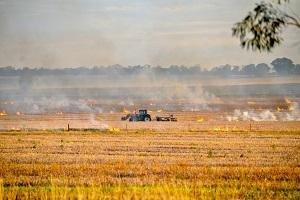Almost 2 years into the pandemic, we have all experienced long and repeated lockdowns. Recent news from New Delhi, however, tell us that the city has gone into another lockdown – this time because of heavy air pollution.
Winter is also the season when air pollution problems in the UNECE region become more apparent. Sources such as residential heating and agricultural practices contribute to poor air quality in the winter as colder air traps the pollution but also doesn't whisk it away so that it stays in place for much longer.
Black carbon (BC) is of particular concern in this context, as it is an air pollutant with significant impacts on our health and climate. Resulting from incomplete combustion processes and as part of fine particulate pollution (PM2.5), it deposits on snow and ice, thereby reducing the Earth’s albedo effect, with a warming impact on the climate. It is recognized widely that mitigating BC emissions (in addition to other greenhouse gases) is necessary to achieve the Paris Agreement goals. This is in addition to the well-established air quality benefits. BC mitigation represents a major opportunity to implement policies that will have co-benefits for climate and air quality.
In the context of the UNECE Convention on Long-range Transboundary Air Pollution, BC is regulated under the amended Gothenburg Protocol (Protocol to Abate Acidification, Eutrophication and Ground-level Ozone as part of particulate matter. Parties at the 41st session of the Executive Body for the Convention this week (6-8 December 2021) adopted new guidance suggesting that in the UNECE region additional measures for wood-fueled heating stoves and agricultural waste burning can reap the biggest benefits to reduce both PM2.5 and BC emissions, promising benefits for air quality, climate, biodiversity and health. While guidance for wood burning had already been adopted in 2019, Parties now adopted guidance to reduce emissions from agricultural waste burning.
Parties agreed that the many negative economic and environmental impacts of agricultural waste burning, ranging from air pollution, greenhouse gas emissions, and soil erosion to loss of biodiversity and soil nutrients, which require the use of expensive fertilizers to maintain crop yields warrant measures to substitute agricultural waste burning practices. Fire-free methods, such as conservation agriculture, low-till methods, and alternative ex situ uses of crop residues, not only eliminate emissions of air pollutants and greenhouse gases, but also provide some level of adaptation and resilience to climate change and extreme weather events.
Agricultural practices were also discussed in the context of a new assessment report on ammonia (NH3), which finds that in order to avoid damage to ecosystems and health, a 30–50 per cent reduction in ammonia emissions is required in areas of the UNECE region with a high density of livestock and use of nitrogen fertilizers. Damaging vulnerable ecosystems, polluting water, exacerbating climate change and exposing the population to harmful secondary particulate matter (PM2.5), ammonia from agriculture is the culprit for many environmental problems and also regulated under the Gothenburg Protocol. While the damage of ammonia emissions to public health and ecosystems costs €10–€25 per kg ammonia, abatement measures are cost-efficient and vary from €0 to €4 per kg ammonia for most countries, up to €15 per kg ammonia in some areas with a high density of livestock.
The Gothenburg Protocol itself was also discussed at the 41st session as its currently ongoing review will be a milestone in how the Convention will further evolve in the years to come.
Key to the Convention’s success in the future will also be stronger cooperation both within and beyond the UNECE region. Recognizing this need, Convention Parties in 2019 launched a new initiative, the forum for international cooperation on air pollution, which aims to support international exchange of information and mutual learning on both the technical and policy levels and is intended to be a repository for technical information and a convener of countries and organizations, facilitating increased international cooperation on this critical challenge.
To operationalize this initiative, Parties established a new Task Force for International Cooperation on Air Pollution, which will be chaired by Sweden and the UK. The Task Force will be comprised of experts from Parties and other interested countries and international organizations. With 40 years of experience in tackling transboundary air pollution on a regional basis, the Convention strives to cooperate with other regions to ascertain common challenges and joint solutions for better air quality globally.
Parties at the 41st session of the Executive Body also welcomed the imminent entry into force of the Protocol on Persistent Organic Pollutants (20 January 2022) and the Protocol on Heavy Metals (8 February 2022), promising further benefits for clean air in the region.


